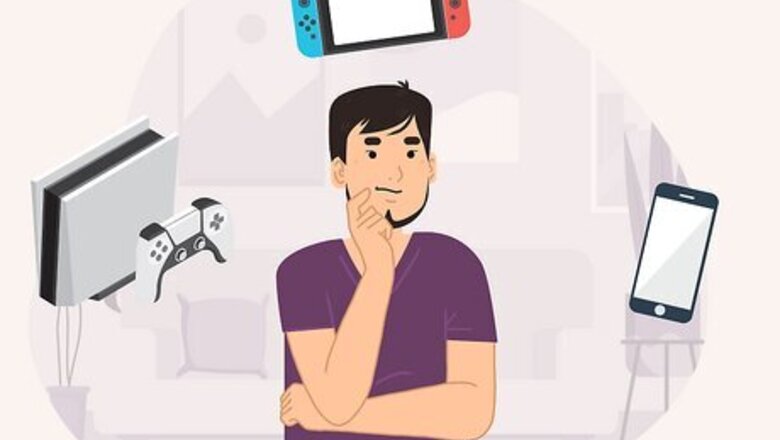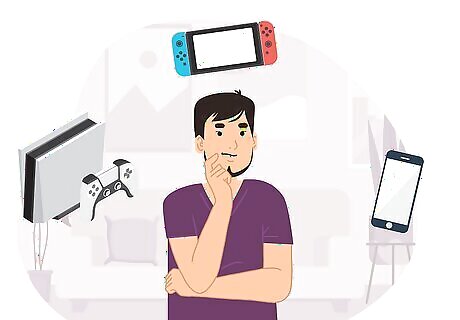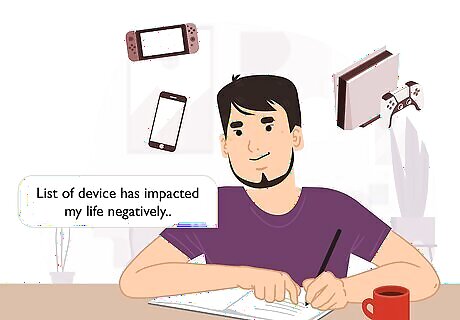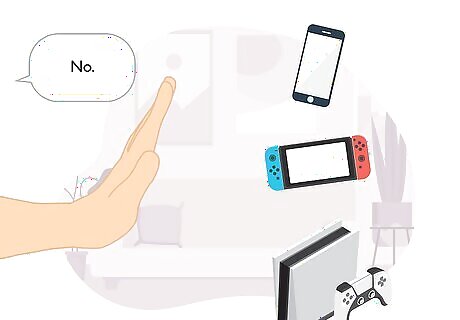
views
X
Research source
Reading this article is your first step to finding that relief.
Consider which aspects of your use you need to change.

Which devices are you having trouble with? Before you can stop using electronic device(s), it is important that you can identify what electronic device(s) you do not want to use for a while.
Brainstorm what the addiction is doing to your life.

Reflect on how the device has impacted your life negatively. This can be done by making a list of what opportunities you missed because of the amount of time and energy you extended on the electronic device. Making a list helps you to realize the amount of time that you have spend on the electronic device; this allows you to realize how much time and energy you have extended onto the electronic device(s). It is by understanding this that will help to motivate you to come up with a plan to replace the energy and time that you have wasted on the electronic device and to use the time and energy more productively to get other things done.
Set your limits.

If you need to go "cold turkey," then the limits are simple. However, chances are you'll need to use some electronics in life, especially for work or school, so quitting altogether isn't an option. Assuming you're going to keep using some such devices, decide on a daily limit. You can base your limit on time used on particular devices, or on which tasks you're going to let yourself do. For example, you might decide only to use the computer for one hour a day, or you might decide only to use it on homework or workplace tasks, but not for any recreational activities.
Write down your rules.

Seeing something set as a list of rules or a schedule in front of you can help you stick to it. Putting it in writing confirms your plan. You might also share it with a friend or loved one who can hold you accountable for sticking to it.
Follow your plan.

Allow yourself the allotted electronic use, without guilt, but stick to your rules. When you hit your limits, move on to something else and stay away from the electronics in question. If you have set time limits for yourself, consider using timers and alarm clocks to help you stick to them. Otherwise, you might lose track of time and unintentionally break your new rules. It might help you avoid temptation to actually physically remove the electronics from your view. Ask a parent, roommate, or friend to keep your gaming system or tablet away from you until your next time for use. Alternatively, remove the power chords and any batteries and stow them out of sight, where you'd have to actively go and get them in order to break your plan.
Find other things to do.

Do alternative activities to fill your time. There are plenty of non-electronic activities you can pursue in life! Try hanging with your loved ones. Your family is your first priority, before electronics. Go see your parents; parents are good company usually. Or, see that movie you've been dying to see with your friends, or go out and have fun at the clubs! Work out! Try a gym, or even at-home workouts. There are many workouts out there that are fun and easy, this will distract you. Get a job. Some jobs may be boring, but then you have time to kill. You don't need some fancy job if you're a teen; work somewhere simple and interesting. Plus, it can get you college money. Read a book. You may be surprised how engaging a great storyline or interesting nonfiction piece can be. If all else fails, try a vacation. Go to the beach or some place you have always wanted to go to.
Don't be too hard on yourself.

Setting limits and sticking to them is key to overcoming your electronic overuse. However, you're only human, and the whole world uses electronics on a daily basis these days. Do what you feel is right for you, but don't beat yourself up about a regular amount of screen time. If you really feel you have an addiction that is interfering with your relationships and responsibilities, consider seeking help. There are therapists who specialize in addictions of all kinds, as well as in-person and online support groups (as ironic as it sounds to attend an online support group for an addiction to electronics, these groups can still help you through such an addiction, depending on what kind of electronics you're addicted to).




















Comments
0 comment